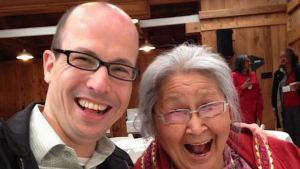By: Jordan P. Lewis, Ph.D., Faculty Investigator
 American Indian and Alaska Native people are growing older and living longer, which means we are also seeing an increase in the number of persons with Alzheimer’s Disease and related dementias. This growth also results in more family members setting into the role of a caregiver, which they may not be adequately prepared to do. Jordan P. Lewis, Aleut, and the Associate Director of the Memory Keepers Medical Discovery Team at the University of Minnesota Medical School, Duluth campus, is committed to partnering with AIAN communities to determine how best to support their caregivers.
American Indian and Alaska Native people are growing older and living longer, which means we are also seeing an increase in the number of persons with Alzheimer’s Disease and related dementias. This growth also results in more family members setting into the role of a caregiver, which they may not be adequately prepared to do. Jordan P. Lewis, Aleut, and the Associate Director of the Memory Keepers Medical Discovery Team at the University of Minnesota Medical School, Duluth campus, is committed to partnering with AIAN communities to determine how best to support their caregivers.
As an Alaska Native, Jordan understands the importance of cultural values, practices, and traditional foods in AIAN health and wellbeing. For the past 14 years, he has explored Indigenous understandings of successful aging and what enables people to transition from growing older into Eldership or achieving the status of Elder. The characteristics and values of Eldership, which include emotional wellbeing and generativity, physical health, spirituality, Native way of life, and community and family engagement, or having a sense of purpose, contribute to their understanding of what enabled them to age successfully or become an Elder.
Since joining the Memory Keepers Medical Discovery Team, Dr. Lewis expanded his research to explore how to integrate these characteristics, and cultural values, into dementia caregiver interventions. Numerous caregiver training programs have been developed and tested over the past several decades, but they lack cultural familiarity and activities. What is needed is for caregiver interventions to build upon the cultural strengths, values, and activities of their family and community.

Dr. Lewis is working with two Tribal Nations in Minnesota to culturally adapt the Savvy Caregiver Program to integrate cultural activities that help caregivers and care recipients achieve contented involvement. These activities can include Powwow dancing, serving of traditional foods, storytelling, and many others. A critical piece to this project is the role of reminiscence therapy to develop questions that elicit positive memories associated with the activities to redirect their family member. The goal of this project is to teach caregivers how to use these cultural activities in place of western-based behavioral management techniques to redirect behaviors, enjoy a cultural activity together, and strengthen the relationship. It is Jordan’s goal to train caregivers how best to manage behaviors associated with dementia using cultural activities available in their homes and are cost-effective and remind everyone our cultural practices, foods, language, and activities hold tremendous strength, value, and meaning to everyone, even our family members with dementia.
